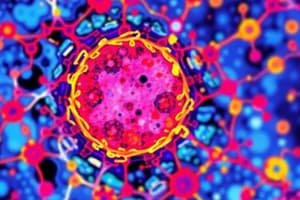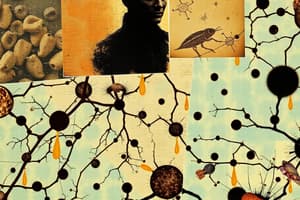Podcast
Questions and Answers
What is the original size of a fiber if its apparent size under a microscope with 400X magnification is 0.6 mm?
What is the original size of a fiber if its apparent size under a microscope with 400X magnification is 0.6 mm?
- 2.4 µm (correct)
- 0.15 µm
- 1.5 µm
- 240 µm
What is the FOV diameter at 400x magnification if the diameter at 40x magnification is 2.0 mm?
What is the FOV diameter at 400x magnification if the diameter at 40x magnification is 2.0 mm?
- 2.0 mm
- 20 mm
- 0.4 mm
- 0.2 mm (correct)
What is the estimated size of a specimen that takes up 4 of the field of view at 400x magnification with a FOV diameter of 1.7 mm?
What is the estimated size of a specimen that takes up 4 of the field of view at 400x magnification with a FOV diameter of 1.7 mm?
- 0.425 mm (correct)
- 1.7 µm
- 0.425 µm
- 0.85 mm
What are the three main points of cell theory?
What are the three main points of cell theory?
Why do plant cells have chloroplasts while animal cells do not?
Why do plant cells have chloroplasts while animal cells do not?
What was one of the controlled variables in Pasteur’s swan neck flask experiment?
What was one of the controlled variables in Pasteur’s swan neck flask experiment?
What is the main function of ribosomes within a cell?
What is the main function of ribosomes within a cell?
What ingredient is the main reactant required for cellular respiration?
What ingredient is the main reactant required for cellular respiration?
Which of the following statements is NOT a point of the cell theory?
Which of the following statements is NOT a point of the cell theory?
What defines a controlled variable in an experiment?
What defines a controlled variable in an experiment?
In Louis Pasteur’s experiment on spontaneous generation, what was the key element that proved his hypothesis?
In Louis Pasteur’s experiment on spontaneous generation, what was the key element that proved his hypothesis?
What is the function of organelles that are exclusively found in plant cells?
What is the function of organelles that are exclusively found in plant cells?
If a microscope has an objective lens of 10x and an ocular lens of 45x, what is the total magnification?
If a microscope has an objective lens of 10x and an ocular lens of 45x, what is the total magnification?
Which of the following is NOT considered an organelle found in eukaryotic cells?
Which of the following is NOT considered an organelle found in eukaryotic cells?
What formula is used to compare different magnifications in microscopy?
What formula is used to compare different magnifications in microscopy?
Which organelle is specifically absent in animal cells compared to plant cells?
Which organelle is specifically absent in animal cells compared to plant cells?
Flashcards
Magnification
Magnification
The ability of a microscope to make an object appear larger.
Objective Lens
Objective Lens
The lens closest to the specimen that produces the first magnified image.
Ocular Lens
Ocular Lens
The lens closest to your eye, which magnifies the image produced by the objective lens.
Total Magnification
Total Magnification
Signup and view all the flashcards
Cell Theory
Cell Theory
Signup and view all the flashcards
Spontaneous Generation
Spontaneous Generation
Signup and view all the flashcards
Manipulated Variable
Manipulated Variable
Signup and view all the flashcards
Responding Variable
Responding Variable
Signup and view all the flashcards
What is magnification?
What is magnification?
Signup and view all the flashcards
What is original size?
What is original size?
Signup and view all the flashcards
What is Field of View (FOV)?
What is Field of View (FOV)?
Signup and view all the flashcards
What are the 3 points of cell theory?
What are the 3 points of cell theory?
Signup and view all the flashcards
What is spontaneous generation?
What is spontaneous generation?
Signup and view all the flashcards
How are prokaryotes and eukaryotes different?
How are prokaryotes and eukaryotes different?
Signup and view all the flashcards
Why do plant cells have chloroplasts and cell walls?
Why do plant cells have chloroplasts and cell walls?
Signup and view all the flashcards
Which organelle produces ATP?
Which organelle produces ATP?
Signup and view all the flashcards
Study Notes
Cell Theory & Microscopy
- Three main points of cell theory:
- All living organisms are composed of one or more cells.
- The cell is the basic unit of structure and organization in organisms.
- All cells arise from pre-existing cells.
Microscopy Techniques
-
Calculating total magnification:
- Multiply the objective lens magnification by the ocular lens magnification.
-
Estimating specimen size:
- Use the formula: FOV diameter / # of specimen across diameter = apparent size of a single specimen
- Use the formula: M₁D₁ = M₂D₂ to find FOV at different magnifications (Where M1 and D1 are magnification and FOV at one magnification and M2 and D2 are magnification and FOV at the second magnification respectively).
Spontaneous Generation
- Definition: The idea that living organisms can arise from nonliving matter.
- Experiments disproving spontaneous generation:
- Francesco Redi's meat experiment: disproved spontaneous generation of maggots from meat.
- Louis Pasteur's swan-neck flask experiment: disproved spontaneous generation of microorganisms from broth.
Cell Structure and Function
-
Definition/function of organelles (Organelles: are specialized structures within cells that perform specific functions):
- Nucleus: Stores the genetic material (DNA).
- Chloroplast: Conducts photosynthesis in plant cells.
- Lysosome: Breaks down waste and cellular debris.
- Endoplasmic Reticulum: Synthesizes proteins and lipids.
- Plant-specific organelles: chloroplasts, cell wall (starred on diagram)
-
Organelles only in plants:
- chloroplasts
- cell walls
Prokaryotic vs. Eukaryotic Cells
- Differences between prokaryotic and eukaryotic cells
- Comparisons between prokaryotes and eukaryotes will require more than one bullet point
Cell Research Advancements
- Examples of cell research advancements:
- any 3 examples of cell research from the class. Why are they considered advancements? Are there ethical implications/issues/concerns?
Importance of Cell Biology
- Reason for studying cell biology:
- Importance for understanding everyday life processes.
Studying That Suits You
Use AI to generate personalized quizzes and flashcards to suit your learning preferences.




